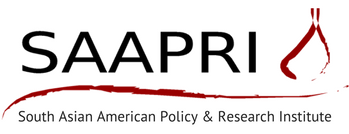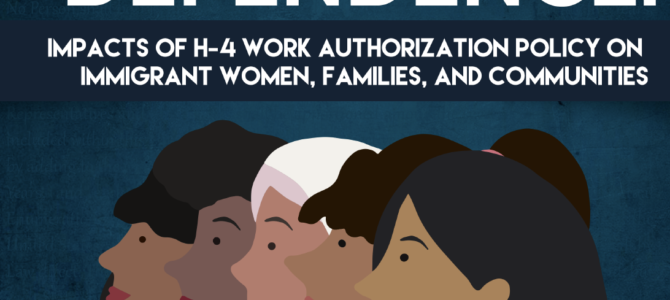On February 20th, 2019, U.S. Citizenship and Immigration Services (USCIS) issued a proposal to remove “H-4 dependent spouses from the class of aliens eligible for employment authorization,” which has been under review for months with an uncertain decision date. Rescinding work authorization for H-4 visa holders disproportionately impacts immigrant women and families from South Asian countries, said SAAPRI in a report released today. SAAPRI studied how the Trump administration’s efforts to revoke the H-4 EAD for H-1B spouses disproportionately impacts South Asian communities in the United States.
The report, Defying Dependence, incorporates survey data from over 100 South Asian H-4 visa holders, dependent spouses of H-1B workers, and includes in depth profiles of six women on the H-4 employment authorization document (EAD) from different parts of the U.S. The report is coauthored by Dr. Amy Bhatt, author of High-Tech Housewives: Indian IT Workers, Gendered Labor, and Transmigration. According to SAAPRI’s findings, since the adoption of the H-4 work authorization policy in 2015, 93% of all H-4 EADs were granted to South Asians and 93% were granted to women.
Current immigration policy is inequitable for those seeking citizenship and belonging in the U.S from select countries. This report aims to voice the experiences of those directly impacted by pending work authorization policy change in the H-4 community, the vast majority being South Asian women and families. Our findings reveal that the H-4 EAD rescission is a racial, economic, and gender justice issue.
Dhara Puvar, Executive Director of SAAPRI
SAAPRI found that revoking the H-4 EAD would have a detrimental impact on economic independence for women, as H-4 visa holders could remain unemployed for up to 10 years or more without the EAD. The report also discusses how the ability to work is closely tied to mental health outcomes for H-4 EAD holders and their families.
[The H-4 EAD] policy change was a life-giver to many women like me who were stuck at home, with no life of their own or sense of purpose.
Urvashi, one of the H-4 EAD holders interviewed for the report
Our hope is that SAAPRI’s data can be used to support advocacy efforts to protect the EAD and drive evidence-based comments to USCIS during the public comment period that will open once the proposed rule change is published to the Federal Register.
Tejas Shah, Board Member of SAAPRI and prominent immigration attorney
On July 22nd, 2019, SAAPRI held a press conference for the launch of the report at the Indo-American Center (IAC).

It is women who would lose the ability to pursue their own careers, their own professions, and to be able to support the family and contribute to the United States economy.
Jan Schakowsky, U.S. Congresswoman
Congresswoman Schakowsky said she is co-sponsoring H.R. 3033, the H-4 Employment Protection Act of 2019, in the U.S. House of Representatives, which protects the H-4 work authorization program. Schakowsky was joined by U.S. Congressman Raja Krishnamoorthi (D-IL 8th District) and Illinois State Representative Jennifer Gong-Gershowitz (D-17th District).
The decision by the Trump administration takes women backward, reinforcing dependency and isolation, confining opportunities for dependent spouses…it places barriers on women’s lives and it’s unacceptable. [She and her colleagues in the Illinois General Assembly] “are doing all we can to mitigate some of the impacts of decisions by the Trump administration.
Jennifer Gong-Gershowitz, Illinois State Representative
SAAPRI’s report calls for the protection of H-4 work authorization and a Congressional solution to the Green Card backlog that will ensure that the H-4 EAD program does not remain a stop-gap solution to current immigration hurdles.

We have to be able to solve the fundamental problem of H-1B holders not being able to get permanent residency in America.
Raja Krishnamoorthi, U.S. Congressman
Congressman Krishnamoorthi is one of the original cosponsors of H.R. 1044, the Fairness for High-Skilled Immigrants Act of 2019, which would address the Green Card backlog issue and was passed by the House of Representatives on July 10th, 2019.
Our findings revealed new evidence, statistics, and case studies that make it clear that rescinding work authorization for H-4 visa holders will have widespread negative consequences for immigrant women, families, and the U.S. at large.
Dhara Puvar, Executive Director of SAAPRI
SAAPRI thanks the South Asian Bar Association of North America Foundation (SABA) and the Chicago Foundation for Women for funding to develop this report.
- Read more about the report in the American Bazaar here and here
- Read more about the report in OPT Nation here
- Read more about the report in American Abroad here
- Read more about the report in the Times of India here
- Read more about the report and effects on Indian wives in the Times of India here and on NBC News here
- Read more about SABA and its efforts in News India Times here and India Abroad here


